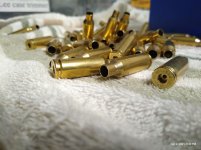Hey. So the last couple batches of brass have been going from super bright and shiny after coming out of the wet tumbler. However after they dry they take on a tarnish. I have not changed how I am processing my brass. I cannot figure out what I am doing wrong.
using tap water with pins
1-hot water with dawn a dash of lemi shine for 30min for an initial rinse
2-hot water with a frankford arsenal cleaning packet, 2h
3-rinse out all the suds with tap water
4-put in brass seperator and spin until the pins and most of the water comes out
5-put on a towel and roll around and toss in the towel
6-into a plastic container with silica gel packs for 2 days to pull the remaining moisture
I have been using this method for several batches of brass with great results. all of a sudden my brass starts getting dingy as it is drying... Im sure my process has room to improve. but I just cant figure out what I am doing wrong....
using tap water with pins
1-hot water with dawn a dash of lemi shine for 30min for an initial rinse
2-hot water with a frankford arsenal cleaning packet, 2h
3-rinse out all the suds with tap water
4-put in brass seperator and spin until the pins and most of the water comes out
5-put on a towel and roll around and toss in the towel
6-into a plastic container with silica gel packs for 2 days to pull the remaining moisture
I have been using this method for several batches of brass with great results. all of a sudden my brass starts getting dingy as it is drying... Im sure my process has room to improve. but I just cant figure out what I am doing wrong....

